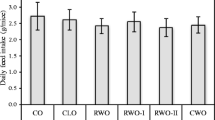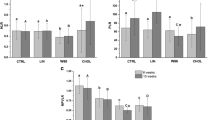Abstract
Most of the studies on the beneficial effects of chia have been conducted with its seeds. There is less evidence about the effects of cold pressed chia seeds oil on hypercholesterolemia-induced alterations. Thus, this study investigated the effects of cold pressed chia seed oil supplementation on certain hematological and biochemical biomarkers in both normal and hypercholesterolemic rabbits. Thirty two male rabbits were assigned to four different groups and fed on: 1) a regular diet (CD), 2) CD supplemented with 10% chia oil, 3) CD supplemented with 1% cholesterol, 4) CD supplemented with 1% cholesterol and 10% chia oil. After six weeks of dietary interventions, mean arterial blood pressure and visceral fat were measured and blood samples were analyzed for lipid profiles and hematological parameters while erythrocyte membranes and retroperitoneal fat were analyzed for fatty acids composition and biochemical biomarkers. Dietary intervention with chia oil achieved control of the hypercholesterolemia-induced increase of mean arterial blood pressure, neutrophil to lymphocytes ratio, erythrocyte membrane fluidity, and improved erythrocyte morphological alterations. With regard to inflammatory biomarkers, chia oil supplementation reduced omega-6/omega-3 polyunsaturated fatty acids ratios and arachidonic/linolenic fatty acids ratios both in erythrocytes and fat from normal and hypercholesterolemic rabbits. The increase of linolenic fatty acid into the retroperitoneal fat was about 9 times higher than its respective controls. These results provide support for the potential health benefits of chia oil intake on hypercholesterolemia-associated clinical, hematological and biochemical alterations.

Similar content being viewed by others
Data Availability
All data generated or analyzed during this study are available from the corresponding author on reasonable request.
References
Karbiner MS, Sierra L, Minahk C, Fonio MC, Bruno MP, Jerez S (2013) The role of oxidative stress in alterations of hematological parameters and inflammatory markers induced by early hypercholesterolemia. Life Sci 93:503–508. https://doi.org/10.1016/j.lfs.2013.08.003
El-Moghazy M, Zedan NS, El-Atrsh AM, El-Gogary M, Tousson E (2014) The possible effect of diets containing fish oil (omega-3) on hematological, biochemical and histopathogical alterations of rabbit liver and kidney. Biom Prev Nutr 4:371–377. https://doi.org/10.1016/j.bionut.2014.03.005
Daak AA, Ghebremeskel K, Hassan Z, Attallah B, Azan HH, Elbashir MI, Crawford M (2013) Effect of omega-3 (n−3) fatty acid supplementation in patients with sickle cell anemia: randomized, double-blind, placebo-controlled trial. Am J Clin Nutr 97:37–44. https://doi.org/10.3945/ajcn.112.036319
Nnamonu EI, Mgbenka BO, Ezewudo B, Mbegbu EC, Ezechukwu CS, Ugwu GC (2020) Omega-3 fatty acids as feed supplement modulates blood formation and body weight in Rattus norvegicus model. J Basic Applied Zool 81:14. https://doi.org/10.1186/s41936-020-00155
Gharekhani A, Khatami MR, Dashti-Khavidaki S, Razeghi E, Abdollahi A, Hashemi-Nazari SS, Mansournia MA (2014) Potential effects of omega-3 fatty acids on anemia and inflammatory markers in maintenance hemodialysis patients. Daru 22(1):11. https://doi.org/10.1186/2008-2231-22-11
Kooshki A, Taleban FA, Tabibi H, Hedayati M (2011) Effects of omega-3 fatty acids on serum lipids, lipoprotein (a), and hematologic factors in hemodialysis patients. Ren Fail 33:892–898
Simopoulos AP, Cleland LG, Christiansen EN (2004) Omega-6/omega-3 essential fatty acid ratio: the scientific evidence. Scandinavian J Nut 48:49–50. https://doi.org/10.1080/11026480410026465
Siener R, Alteheld B, Terjung B et al (2010) Change in the fatty acid pattern of erythrocyte membrane phospholipids after oral supplementation of specific fatty acids in patients with gastrointestinal diseases. Eur J Clin Nutr 64:410–418. https://doi.org/10.1038/ejcn.2009.151
DiNicolantonio JJ, O'Keefe JH (2018) Importance of maintaining a low omega-6/omega-3 ratio for reducing inflammation. Open Heart 5(2):e000946. https://doi.org/10.1136/openhrt-2018-000946
Martínez-Cruz O, Paredes-López O (2014) Phytochemical profile and nutraceutical potential of chia seeds (Salvia hispanica L.) by ultra high performance liquid chromatography. J Chromatogr A 1346:43–48. https://doi.org/10.1016/j.chroma.2014.04.007
Akinfenwa AO, Cheikhyoussef A, Cheikhyoussef N, Hussein AA (2020) Cold pressed chia (Salvia hispanica L.) seed oil. In: Ramadan MF (ed) Cold pressed oils. Academic Press, pp 181–190. https://doi.org/10.1016/B978-0-12-818188-1.00015-3
Gopalam R, Manasa V, Vaishnav SR, Daga P, Tumaney AW (2022) Profiling of lipids, nutraceuticals, and bioactive compounds extracted from an oilseed rich in PUFA. Plant Foods Hum Nutr 77:98–104. https://doi.org/10.1007/s11130-021-00945-0
Santos HO, Price JC, Bueno AA (2020) Beyond fish oil supplementation: the effects of alternative plant sources of omega-3 polyunsaturated fatty acids upon lipid indexes and cardiometabolic biomarkers-an overview. Nutrients 12:3159. https://doi.org/10.3390/nu12103159
Parker J, Schellenberger AN, Roe AL, Oketch-Rabah H, Calderón AI (2018) Therapeutic perspectives on chia seed and its oil: a review. Planta Med 84:606–612. https://doi.org/10.1055/a-0586-4711
Sierra L, Roco J, Alarcón G, Medina M, Van Nieuwenhove C, Peral M, Jerez S (2015) Dietary intervention with Salvia hispanica (chia) oil improves vascular function in rabbits under hypercholesterolaemic conditions. J Funct Foods 14:641–649
Jerez S, Scacchi F, Sierra L, Karbiner S, Peral de Bruno M (2012) Vascular hyporeactivity to angiotensin II and noradrenaline in a rabbit model of obesity. J Cardiovasc Pharmacol 59:49–57
Alarcon G, Roco J, Medina A, Van Nieuwenhoven C, Medina M, Jerez S (2016) Stearoyl-CoA desaturase indexes and n-6/n-3 fatty acids ratio as biomarkers of cardiometabolic risk factors in normal-weight rabbits fed high fat diets. J Biom Sci 23:13
Toscano LT, da Silva CS, Toscano LT, de Almeida AE, Santos Ada C, Silva AS (2014) Chia flour supplementation reduces blood pressure in hypertensive subjects. Plant Foods Hum Nutr 69:392–398. https://doi.org/10.1007/s11130-014-0452-7
Alwosais EZM, Al-Ozairi E, Zafar TA, Alkandari S (2021) Chia seed (Salvia hispanica L.) supplementation to the diet of adults with type 2 diabetes improved systolic blood pressure: a randomized controlled trial. Nutr Health 27:181–189. https://doi.org/10.1177/0260106020981819
San Pablo-Osorio B, Mojica L, Urías-Silvas JE (2019) Chia seed (Salvia hispanica L.) pepsin hydrolysates inhibit angiotensin-converting enzyme by interacting with its catalytic site. J Food Sci 84:1170–1179. https://doi.org/10.1111/1750-3841.14503
Takeuchi H, Sakurai C, Noda R, Sekine S, Murano Y, Wanaka K, Kasai M, Watanabe S, Aoyama T, Kondo K (2007) Antihypertensive effect and safety of dietary alpha-linolenic acid in subjects with high-normal blood pressure and mild hypertension. J Oleo Sci 56:347–360. https://doi.org/10.5650/jos.56.347
Pieters DJ, Zock PL, Fuchs D, Mensink RP (2019) Effect of α-linolenic acid on 24-h ambulatory blood pressure in untreated high-normal and stage I hypertensive subjects. Br J Nutr 121:155–163. https://doi.org/10.1017/S0007114518003094
Schulz E, Gori T, Münzel T (2011) Oxidative stress and endothelial dysfunction in hypertension. Hypertens Res 34:665–673. https://doi.org/10.1038/hr.2011.39
Pizzini A, Lunger L, Demetz E, Hilbe R, Weiss G, Ebenbichler C, Tancevski I (2017) The role of omega-3 fatty acids in reverse cholesterol transport: a review. Nutrients 9(10):1099. https://doi.org/10.3390/nu9101099
Doughman SD, Krupanidhi S, Sanjeevi CB (2007) Omega-3 fatty acids for nutrition and medicine: considering microalgae oil as a vegetarian source of EPA and DHA. Current Diab Rev 3:198–203
Fonte-Faria T, Citelli M, Atella G, Fonseca Raposo H, Zago L de Souza T, Vargas da Silva S, Barja-Fidalgo C (2019) Chia oil supplementation changes body composition and activates insulin signaling cascade in skeletal muscle tissue of obese animals. Nutrition 58:167–174
Han K, Li X-Y, Zhang Y-Q, He Y-L, Hu R, Lu XL, Li Q-J, Hui J (2020) Chia seed oil prevents high fat diet induced hyperlipidemia and oxidative stress in mice. Eur J Lipid Sci Technol 122:1900443. https://doi.org/10.1002/ejlt.201900443
Mihafu FD, Kiage BN, Kimang’a AN, Okoth JK (2020) Effect of chia seeds (Salvia hispanica) on postprandial glycaemia, body weight and hematological parameters in rats fed a high fat and fructose diet. Int J Biol Chem Sci 14:1752–1762
Alagawany M, Nasr M, Al-Abdullatif A, Abdullah Alhotan R, Azzam M, Reda FM (2020) Impact of dietary cold-pressed chia oil on growth, blood chemistry, haematology, immunity and antioxidant status of growing Japanese quail. Italian J Animal Sci 19:896–904. https://doi.org/10.1080/1828051X.2020.1807420
Cicha I, Suzuki Y, Tateishi N, Maeda N (2004) Effects of dietary triglycerides on rheological properties of human red blood cells (abstract). Clin Hemorheol Microcirc 30:301–305
Song M, Graubard BI, Rabkin CS, Engels EA (2021) Neutrophil-to-lymphocyte ratio and mortality in the United States general population. Sci Rep 11:464. https://doi.org/10.1038/s41598-020-79431-7
Mohamed DA, Mohamed RS, Fouda K (2020) Anti-inflammatory potential of chia seeds oil and mucilage against adjuvant-induced arthritis in obese and non-obese rats. J Basic Clin Physiol Pharmacol 31. https://doi.org/10.1515/jbcpp-2019-0236
Ayerza R, Coates W (2003) Ground chia seed and chia oil effects on plasma lipids and fatty acids in the rat. Nutr Res 25:995–1003. https://doi.org/10.1016/j.nut.2018.08.011
Poudyal H, Panchal SK, Waanders J, Ward L, Brown L (2012) Lipid redistribution by α-linolenic acid-rich chia seed inhibits stearoyl-CoA desaturase-1 and induces cardiac and hepatic protection in diet-induced obese rats. J Nutr Biochem 23:153–162. https://doi.org/10.1016/j.jnutbio.2010.11.011
Pandohee J (2022) Alpha-linolenic acid. In: Kour J, Nayik GA(ed) Nutraceuticals and health care, Academic Press, pp 279–288. https://doi.org/10.1016/B978-0-323-89779-2.00003-X
Acknowledgements
The authors thank Agustina Gonzalez Colombres and Roxana Giribaldi for technical support. In addition, we thank Dr Patricia Black for language assessment of the revised manuscript.
Funding
This research was supported by: PICT 2015/1164 (ANCyT-Argentina); PIUNT G621 (SCAIT, Argentina) and by institutional funds from Instituto Superior de Investigaciones Biológicas (INSIBIO).
Author information
Authors and Affiliations
Contributions
All authors contributed to the study conception and design. Material preparation, data collection and analysis were performed by Gabriela Alarcón, Julieta Roco, Liliana Sierra, Analia Medina, Carina Van Nieuwenhove and Mirta Medina. The first draft of the manuscript was written by Susana Jerez and all authors commented on previous versions of the manuscript. All authors read and approved the final manuscript.
Corresponding author
Ethics declarations
Ethical Approval
All experimental protocols were approved by the Institutional Animal Ethics Committee (CICUAL from the National University of Tucuman, Argentina-Approval number: 021/2019; Date: November 15th, 2019; Date endorsed: March 23th, 2021) according to the Guide for the Care and Use of Laboratory Animals (NIH Publication 8th edition, updated 2011).
Consent to Participate
Not applicable.
Consent for Publication
Not applicable.
Conflict of Interest
The authors have no competing interests to declare.
Additional information
Publisher's Note
Springer Nature remains neutral with regard to jurisdictional claims in published maps and institutional affiliations.
Supplementary Information
Below is the link to the electronic supplementary material.
Rights and permissions
Springer Nature or its licensor (e.g. a society or other partner) holds exclusive rights to this article under a publishing agreement with the author(s) or other rightsholder(s); author self-archiving of the accepted manuscript version of this article is solely governed by the terms of such publishing agreement and applicable law.
About this article
Cite this article
Alarcon, G., Sierra, L., Roco, J. et al. Effects of Cold Pressed Chia Seed Oil Intake on Hematological and Biochemical Biomarkers in Both Normal and Hypercholesterolemic Rabbits. Plant Foods Hum Nutr 78, 179–185 (2023). https://doi.org/10.1007/s11130-022-01036-4
Accepted:
Published:
Issue Date:
DOI: https://doi.org/10.1007/s11130-022-01036-4




